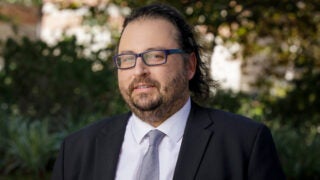Already Broken Into Hollywood? USC’s ‘TEN’ is for Mid-Career Pros
The Trojan Entertainment Network (TEN) for the entertainment world now numbers nearly 2,000 members.
Here’s a simple question: What USC school produces Trojans who go on to work in the entertainment industry?
If you said the USC School of Cinematic Arts, you’d be right. But if you said the USC Marshall School of Business, you’d also be right. Same goes for USC Dornsife College of Letters, Arts and Sciences, USC Annenberg School for Communication and Journalism, USC Gould School of Law and several others.
This reality is at the heart of the Trojan Entertainment Network (TEN), a highly successful alumni group that’s breaking the alumni relations mold.
Traditionally, USC alumni groups have converged around a school, a geographical region, an age range or an identity—women, LGBT, Latino, African American and so on. But in today’s boundary-busting professional world, an entertainment lawyer might have more in common with a video game designer or a reporter from Variety than with a divorce attorney or a public defender. TEN brings together alumni who work in entertainment, regardless of their professional discipline or major.
TEN founders Jim Kelly MFA ’10, Alex Lazaris ’04, MBA ’10 and Ian Christian Blanche MFA ’10 tapped into something big when they established the group in 2010. Demand from Trojans across the entertainment industry kept growing, and they eventually turned to USC Alumni Association (USCAA) chief executive Patrick Auerbach EdD ’08 for university backing and staff support.
Auerbach, associate senior vice president for alumni relations, was happy to help. The group became a chartered member of the USCAA in 2014 and already has nearly 2,000 members.
TEN is selective. Applicants must work in the industry and hold a degree from USC. Undergraduate alumni must wait two years after graduation to apply, though graduate alumni can apply immediately, says Erin Mascho, USCAA’s liaison with the group. They must go through a screening that involves verification of degree status and employment. Basic membership is free, but paid levels (Indie $100, Studio $250) come with perks, such as invitations to exclusive events.
Career development is a huge draw. While the USC Career Center organizes job fairs and networking events for entry-level alumni, TEN is about “providing more sophisticated programming content and a forum for mid-career professionals to network,” Auerbach says.
The alumni network concept opens up a new frontier, according to Auerbach, and USCAA President Amy Ross PhD ’86 agrees. “We realize the old ways of looking at alumni engagement don’t always work anymore,” she says. “It’s more than going to a football game or going to your class reunion. It’s about, How can you stay engaged? How can the university be relevant?”
Inspired by TEN’s success, three new Trojan networks are in development and will target real estate, education and veterans. (Although not an industry, veterans are well suited for an alumni network because there is a strong shared identity, and alumni come from all disciplines).
Networks won’t replace school-based groups or other alumni clubs. They’ll add to them. Ultimately, alumni relations aims for inclusion. “We want to encourage involvement with the university,” Auerbach says. “We want to build volunteerism, and we also want to build philanthropy back to USC.”
For more information or to apply for TEN membership, visit uscten.com.



